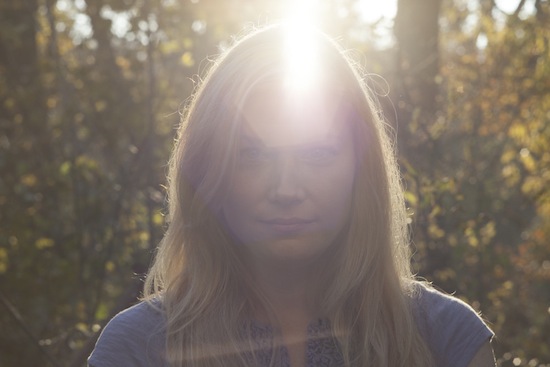Photograph courtesy of Ron Harrell
It’s an odd reaction. I’ve just told New York singer-songwriter Marnie Stern that I love her new album – the subtly entitled The Chronicles Of Marnia – and she actually winces. It seems she has an unusually difficult relationship with her fourth long-player and follow-up to 2010’s much-lauded Marnie Stern.
To be fair to her, The Chronicles Of Marnia did involve a number of big changes for Stern. It’s her first album without drummer Zach Hill (who is now knee-deep in Death Grips) – Oneida’s Kid Millions is on stick duties – and the first time she’s worked with a producer. She chose Nicholas Vernhes to help declutter her sound, while keeping the extraordinary finger-tapping guitar style that Stern so excels at. The resultant album is less dense than her previous work and one that pushes Stern’s vocal to the fore. The Chronicles Of Marnia is more about the songs, and less about the noise. It works – but Stern is still struggling to accept the shift in focus.
When I speak with Marnie over a crystal-clear Skype video link she admits to being tired from the previous night’s show where she performed alongside members of Bow Wow Wow, Nada Surf and Yo La Tengo. She’s cuddling her dog, Fig, who also stars on the cover of The Chronicles Of Marnia. She is just about the perfect interviewee – super-smart, funny and open – and manages to answer my first five questions without seemingly pausing for breath.
And Marnie is a chatter. Before we begin to discuss her new album we sidetrack onto New York’s current – and, for the Jewish Stern, unexpected – love affair with bacon (“there were bacon-wrapped matzo balls on a menu last night”) as well as her introduction to Beyoncé by way of a recent TV documentary (“I could not take her seriously – all I could think was ‘what an attractive lady’ – it was very distracting”).
We also talk about her record label’s decision recently to launch a ‘Win A Date With Marnie Stern’ competition, in which the men of New York were invited to submit their credentials (the stipulations included “no vegans or slackers” and the requirement to provide a list of any anti-depressants the gents were currently taking). Marnie has mixed feelings about the concept. “I don’t get to pick my date and now I’m starting to think this is not such a great idea,” she says – and she has a point. “And imagine if no-one had responded? That would have been too embarassing.” Perish the thought.
So, I’m really liking the new album. I think it might be my favourite of yours.
Marnie Stern: Really? Thank you. That’s so nuts because I think the artist can’t have any proper perspective. I can’t even listen to some of the songs because my voice is clear and it is very uncomfortable for me. I’ve only been able to listen to it when we recorded it and I haven’t heard it since.
I like being able to hear your voice more clearly.
MS: Hmm, urrgh. That’s so hard for me to hear. I know that space is good in music but I can’t do it. I need it to be very cluttered and I don’t know if that is to hide but it’s why I hear the clear voice as almost like Taylor Swift. I know it is irrational. For Zach [Hill] and I, we don’t think less is more, we think more is more. And I know usually that’s bad for a song unless you are looking for a nutso thing.
The Chronicles Of Marnia is your first record without Zach on drums. Was that solely due to his involvement with Death Grips?
MS: Well, I had been wanting to try something different but what Zach and I had built was so good that I didn’t know how to go about it. I have been trying to pare down the songs and make them sparser and I knew Zach’s drumming would make them busier. So, when Death Grips happened it just worked out, because Zach was doing that. I thought I’d try with Kid Millions, but the producer [Nicholas Vernhes] even kept saying ‘play something simpler’ to him.
I was going to ask about Nicholas. It was also your first album with a producer – what were you hoping to achieve by working with him?
MS: Everything I chose was meant to change the direction a little bit. Zach and I had pretty similar tastes so that we would agree on most stuff. So, getting Nicholas was a big deal because I had never worked with a producer. Also, I was trying to get better with conflict and saying "no" when I don’t like things. On my first or second record, even if I was completely dissatisfied I would have gone along with things, just because that is my nature. As it was my fourth, I argued with everybody in there. Even though I wanted to change, I had this feeling in my stomach about whether it was a good idea.
Why the resistance? What were you fighting against?
MS: I think I have worked so hard to define what I sound like. I do certain things with my voice that make me be me, and certain things with layering guitars and I thought if I let go of any of those things – stripped it down or sang on key – then it would lose its personality and be bland.
But The Chronicles Of Marnia is anything but bland.
MS: Well thank you – but I still don’t know if I agree with you. In the end, I’m fine with it – I can’t listen to it – and I know I’m not being really rational. It’s the battle between finding your voice and sticking with it and the letting go and trying different things. I’ve spent 15 years playing this goddamn guitar on these songs to get my own style and you want me to not sound like me?
How do you approach writing a new album?
MS: It’s like a job where I have to sit and work on stuff. I will latch onto little tiny themes and keep them in the back of my mind. I go to Florida a lot to visit my mum and she listens to 50s rock in the car, so for this record I was listening to a lot of Chuck Berry and some very specific guitar sounds were in my mind. On the last record I was going through all these personal things so it was very depressing but you don’t realise until the clouds have parted. Since then things have been pretty good so this record is more upbeat.
The music is more upbeat, but the lyrics still seem a little bleak. And I mean that in a good way.
MS: Ha. The lyrical content is always me working through worries or things that I am going through. The things I am always usually going through are a creative struggle to keep stuff fresh because, like anything, when you are sitting there day after day you get very comfortable doing routine things in terms of songwriting. For me, I have to do hundreds of things to break away from that routine. I have to come up with so many different ideas and it takes a lot of energy to do. For example, I might say "today I am just going to write a song with my voice and I will add guitar after". That might not work so the next day I am going to sit down and do a song with just punk-pop power chords. Can I do it? No, okay, I’m going to sit down and take my angriest self and try and be a real bitch for this song.
That sounds like a real slog – lots of perspiration to get the inspiration.
MS: It’s like that every day and it is exhausting, but eventually I might find a small piece which is a fresh idea. I have to do that or it would sound like the same song, over and over. I’m sure I still sound pretty similar but I do really try hard to shake things up. So, a lot of the lyrics are about that battle and also envy of all my favourite artists who are just so prolific and I have jealousy and my thoughts just spin around and round. All these types of things are circulating non-stop. A downside is that I begin to hate music in a way because I am just so absorbed by it. It’s overwhelming and I just want to shut it off a lot of the time.
That could drive a person crazy.
MS: It could. Also, for no particular reason, I hadn’t heard from Kill Rock Stars and I thought there was a chance I wouldn’t be able to release another album. That’s just so scary because it is so uncertain and everything is so tentative all the time. You’d like to be in a place where you have been doing something for long enough that you feel like that you are going to be able to put an album out. That effects my self-esteem – "if I was a better musician, this wouldn’t be happening" – and the mental game goes on.
If you don’t mind me saying, you seem to have a very unusual relationship with the songs on The Chronicles Of Marnia.
MS: Yes, and an emotional one too. I think I think about things way too much and that’s a problem too. There comes a point where there is no point – it almost becomes masochistic. I worry a lot about things I cannot control. It’s so very frustrating to be an artist where you really don’t have any control over anything. Once an album is out people either listen to it or they don’t. I guess the lesson is to put in the work and if you get something good, then great. Part of me would like the kind of job with something tangible at the end that is done, with a result.

Photograph courtesy of Ron Harrell
In terms of your music, why are you so hard on yourself?
MS: It’s my nature to think the worst. That’s what the songs are for – it’s constantly me battling against my darker side. I lie in bed worrying. I compare myself against my other friends who are married and have children and homes. They have things in life. I look at myself and I have nothing – I’m lying in the bed with the dog. I have a dog. It’s really more for my family that I feel embarrassed – I’m the age I am and I cannot provide for myself, doing what I do. That’s where I feel bad, but on the other hand I could go out and get an office job. I’m culpable too. I could be making a living.
Do you not think of your music as a career?
MS: On the third record, I got really caught up in thinking of it as a career. When you are trying to measure your value as a human being based on what kind of coverage your album is getting, it’s absurd. And when you play a show you are looking at the audience and thinking "there were more people last time – does that mean I’m less popular and my music sucks?" It’s ridiculous and completely negates the whole experience for the people who are there to see you and you want to give a good show to. Right now, I’m in a really happy place when it comes to all of that stuff and appreciating everything. I guess I am proud of myself for sticking with it for so long.
Indeed. You are often described as a guitar ‘virtuoso’ due to your particular style – is there a sense that this gets in the way of you being accepted as a singer-songwriter?
MS: You are exactly right. When I think of a good guitarist I don’t usually think of a songwriter – I just think of a good guitarist in a band. Ultimately, I use the guitar to make the song better – the song is the thing. But it’s always "she’s a guitar player". On the other hand, here I am playing a million notes and it’s not like I am being subtle about it, but I would love it if people thought that I wrote good songs.
The Chronicles Of Marnia is out now via Kill Rock Stars



